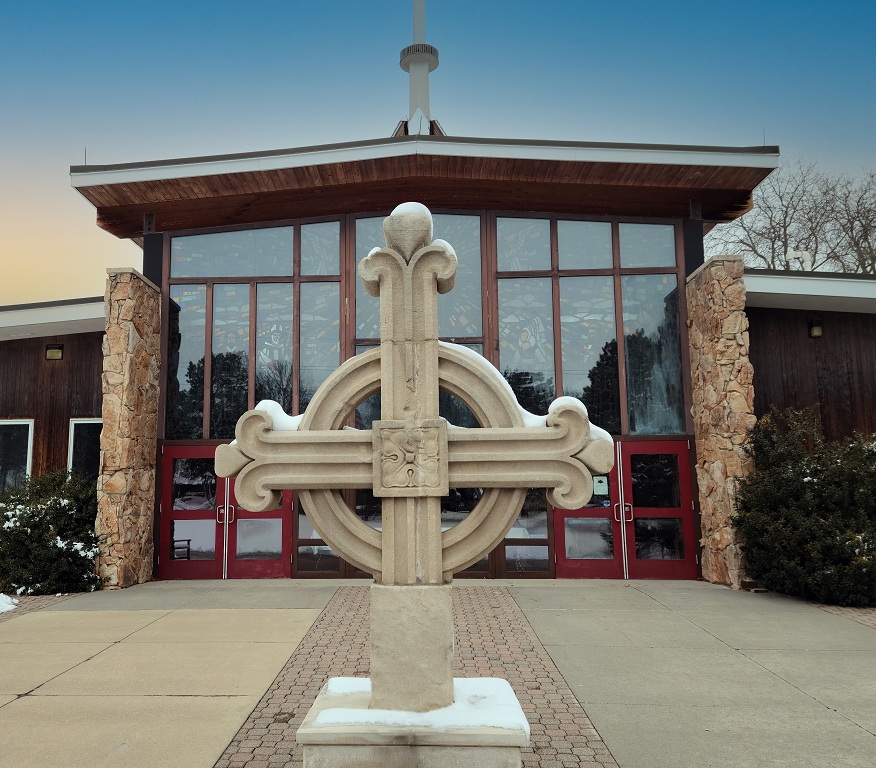Knowledge Puffs Up, But Love Builds Up
Did you notice in today’s reading from Paul, it almost sounds like the Corinthians communicate via Twitter? It’s as if Paul’s letter to them is full of echoes of their own tweets: “all of us possess knowledge,” “no idol in the world really exists,” “there is no God but one,” “food will not bring us close to God.” The disciples in Corinth are trying to justify their actions with little sound bites. What actions exactly are they justifying? It was a common pagan practice at that
time to sacrifice an animal to some deity or another, burn a bit of it in offering on the altar, and either sell the rest of the animal in the marketplace or use the meat at a festival or social event. Because of this, Corinthian Christians who ate meat could be eating food that was sacrificed to an idol. There were many disciples in Corinth who were not going to let that stop them from enjoying a nice steak or cause them to turn down an invitation to a smart party! They had the sure knowledge that the idols were impotent, false gods. They had knowledge of the message of Gospel liberty Paul had preached to them before, and they knew that liberty meant nothing they ate or didn’t eat could keep them from God, or bring them closer to God. They were sure; they knew they could do whatever they wanted.
But Paul offers them a sound bite, a tweet, in return—one that has the sting of rebuke in it: “knowledge puffs up, but love builds up.” Throughout his letters to the Corinthians, Paul is insistent in his message that responsibility to God, rather than being measured by the knowledge of and following the rules, the 613 religious laws of the Talmud, is measured instead in ways we are responsible to each other, responsible to the sisters and brothers in our Christian community, responsible to the wider community and world we live in. We hear this contrast between the liberty of knowledge and the liberty of love ringing most familiar to us in chapter 13 of Corinthians: “Love is not envious or boastful or arrogant or rude. It does not insist on its own way; it is not irritable or resentful; it does not rejoice in wrongdoing, but rejoices in the truth. It bears all things, believes all things, hopes all things, endures all things.” Maybe, Paul suggests, while the liberty of knowledge allows them to eat any meat they want, the liberty of love requires them to bear and endure for their fellow disciples. Yes, it is a truth that God’s New Covenant in Jesus brings liberty—but Paul tells them, “Take care that this liberty of yours does not somehow become a stumbling block to the weak” (v.9).
This word Paul uses for “liberty” has a bit of nuance, meaning “the power to act,” “authority”—and it is the very same word we hear in today’s Gospel reading when the people are amazed at seeing Jesus cast out the demon. They ask one another: “What is this? A new teaching—with authority! He commands even the unclean spirits, and they obey him.” Now when I heard this passage read out loud a few minutes ago, I wanted to ask, “Wait…hold on…what new teaching? Did I miss something?” Yes, too often I do miss it—too often, just like the Corinthians, just like the bystanders in Mark’s story—we miss Jesus radical new teaching: God does want obedience, but not our obedience to a list of laws we can interpret to our own gain—just our obedience to one law—the law of love. Love acts; love builds up; love does things; love is transformational; love is powerful. In addition to offering a carefully worded sermon and an insightful analysis of scripture in his teaching at this synagogue—in addition to showing knowledge, Jesus offers something new: Jesus’ acts.
Throughout all of Mark, all of the Gospels, Jesus invitation to participate in the Kingdom of God is new and radical and action-packed. At the very beginning of the Gospel of Mark, the first five stories we hear of Jesus ministry are: today’s encounter in the synagogue with the man possessed by a demon, then touching and healing Simon’s mother-in-law who was sick with a fever, then cleansing a leper, then healing a paralytic, then calling Levi the tax collector—the tax collector!—to be a disciple and eating and drinking with many tax collectors and sinners at Levi’s house. That all happens within 41 verses! It’s often left out of our English translations, but Mark uses the word “immediately” in the same way an excited child telling a story keeps saying, “and then, …and Then, …and THEN!” Mark uses “immediately” 41 times—12 times just in the first chapter, and 3 times in today’s 8 verses! Jesus is not just a teacher—he has power to make the unclean clean—immediately! Jesus teaches them as one having authority, having not just authority to teach, as the scribes do, but the authority and the liberty and power to act. And Jesus actions break every rule, break every law—he works his mission not among the powerful and the religious, but among the lowly, the sinners, and he dines with them, and he even touches them…and his touch heals them and makes them clean. Jesus breaks every law—except the law of love.
Jesus’ kingdom is breaking into this world, now, immediately, breathlessly. Jesus expects us to follow, breathlessly. We have the liberty and power to act—to act in boundary-breaking, law-transcending ways—to act not with a self-assured, self-justifying, certain knowledge of individual freedom and power that in the end simply enables us to justify any selfish action, any status quo—no, to act instead according to the law of love, with the knowledge that true liberty is found in service and obedience to God through humble love and care for friend, neighbor, stranger, alien, and even enemy.
Knowledge puffs up, but love builds up. What and who will you build up with your knowledge today?




Comments
Post a Comment